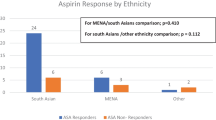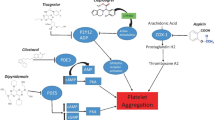Abstract
Introduction
Japanese guidelines recommend aspirin 160–300 mg/day, starting within 48 h, for patients with acute cerebral infarction. However, there are few reports evaluated in Japanese patients. Our objective was to examine the safety and efficacy of enteric-coated aspirin, compared with other oral antiplatelet drugs, in Japanese patients with acute ischemic stroke.
Methods
We performed a prospective, non-randomized, observational and multicenter study between June 2005 and December 2007. Patients with symptomatic acute ischemic stroke, including transient ischemic attack (TIA), who started enteric-coated aspirin or other antiplatelet drugs within 7 days of hospitalization were registered. Outcome measures evaluated within 3 months were incidence of cerebral and non-cerebral hemorrhagic events, recurrence of ischemic stroke or TIA, non-cerebral ischemic events and death from any cause.
Results
Overall, 2,548 and 830 patients treated with enteric-coated aspirin (100–300 mg/day) or other antiplatelet drugs, respectively, were registered; approximately 60% were male, mean age was 70 years, 85% had pre-existing cardiovascular disease or other complications. Enteric-coated aspirin of 100 mg was mainly prescribed, and only approximately half of the patients were started on it within 48 h after onset of ischemic stroke. Safety and efficacy population excluded patients without follow-up data were 2,521 in enteric-coated aspirin and 807 in other antiplatelets. Hemorrhagic events occurred in 46 (1.8%) in the enteric-coated aspirin group and in 13 (1.6%) in the other antiplatelet drugs group, there was not significant. Recurrent ischemic stroke or TIA occurred in 39 (1.5%) of the enteric-coated aspirin and in 18 (2.2%) of other antiplatelet drugs, and there were any-cause death in 16 (0.6%) and 8 (1.0%). Incidences were slightly lower in the enteric-coated aspirin group compared with the other antiplatelet drugs group, but not statistically significant.
Conclusion
It seems that these results showed the safety and efficacy of the enteric-coated aspirin in acute stroke care in Japanese patients. Incidence of hemorrhagic events was comparable between the enteric-coated aspirin group and the other antiplatelet drugs group.



Similar content being viewed by others
References
Olson DM, Cox M, Pan W, et al. Death and rehospitalization after transient ischemic attack or acute ischemic stroke: one-year outcomes from the adherence evaluation of acute Ischemic stroke-longitudinal registry. J Stroke Cerebrovasc Dis. 2013;22:e181–8.
Nemerovski CW, Salinitri FD, Morbitzer KA, Moser LR. Aspirin for primary prevention of cardiovascular disease events. Pharmacotherapy. 2012;32:1020–35.
CAST (Chinese Acute Stroke Trial) Collaborative Group. CAST: randomised placebo-controlled trial of early aspirin use in 20,000 patients with acute ischaemic stroke. Lancet. 1997;349:1641–9.
International Stroke Trial Collaborative Group. The International Stroke Trial (IST): a randomised trial of aspirin, subcutaneous heparin, both, or neither among 19,435 patients with acute ischaemic stroke. Lancet. 1997;349:1569–81.
Chen ZM, Sandercock P, Pan HC, et al. Indications for early aspirin use in acute ischemic stroke: a combined analysis of 40,000 randomized patients from the Chinese acute stroke trial and the international stroke trial. On behalf of the CAST and IST collaborative groups. Stroke. 2000;31:1240–9.
Shinohara Y, Yanagihara T, Abe K, et al. II. Cerebral infarction/transient ischemic attack (TIA). J Stroke Cerebrovasc Dis. 2011;20(4 Suppl):S31–73.
Ministry of Health, Labour and Welfare, Japan. Ordinance on standards for conducting post-marketing surveillance and studies on drugs (Ordinance 171; December 20, 2004). Tokyo: Ministry of Health, Labour and Welfare; 2004.
Joint Committee on Japanese Guidelines for the Management of Stroke 2004 and 2009. Japanese guidelines for the management of stroke 2009. J Stroke Cerebrovasc Dis. 2011;20(4 Suppl):S1–180.
European Stroke Organisation (ESO) Executive Committee. Guidelines for management of ischaemic stroke and transient ischaemic attack 2008. Cerebrovasc Dis. 2008;25:457–507.
Jauch EC, Saver JL, Adams HP Jr, et al. Guidelines for the early management of patients with acute ischemic stroke: a guideline for healthcare professionals from the American Heart Association/American Stroke Association. Stroke. 2013;44:870–947.
Shinohara Y, Katayama Y, Uchiyama S, et al. Cilostazol for prevention of secondary stroke (CSPS 2): an aspirin-controlled, double-blind, randomised non-inferiority trial. Lancet Neurol. 2010;9:959–68.
Shinohara Y, Nishimaru K, Sawada T, et al. Sarpogrelate-aspirin comparative clinical study for efficacy and safety in secondary prevention of cerebral infarction (S-ACCESS): a randomized, double-blind, aspirin-controlled trial. Stroke. 2008;39:1827–33.
Toyoda K, Yasaka M, Iwade K, et al. Dual antithrombotic therapy increases severe bleeding events in patients with stroke and cardiovascular disease: a prospective, multicenter, observational study. Stroke. 2008;39:1740–5.
Acknowledgments
Sponsorship and article processing charges for this study were funded by Bayer. Will Medical Communications assisted the authors with the submission process and this assistance was funded by Bayer. Dr Shunichi Takahashi is the guarantor for this article, and takes responsibility for the integrity of the work as a whole. The funding source was involved in the study design, the collection, analysis and interpretation of data, the writing of the report, and the decision to submit the paper for publication. The funding source had no influence over any treatment decisions.
Conflict of interest
Shunichi Takahashi is an employee of Bayer.
Osamu Mizuno is an employee of Bayer.
Toshiaki Sakaguchi is an employee of Bayer.
Takashi Yamada is an employee of Bayer.
Lyo Inuyama is an employee of Bayer.
Compliance with ethics guidelines
All study procedures followed were in accordance with the ethical standards of the responsible committee on human experimentation (institutional and national), the Helsinki Declaration of 1975, as revised in 2000 and 2008, and the principles of Good Post-marketing Study Practice. The institutional review board of each participating institution approved the study protocol. Informed consent was not obtained, as Japanese law does not require informed consent for this type of observational study.
Author information
Authors and Affiliations
Corresponding author
Electronic supplementary material
Below is the link to the electronic supplementary material.
Rights and permissions
About this article
Cite this article
Takahashi, S., Mizuno, O., Sakaguchi, T. et al. Enteric-Coated Aspirin Versus Other Antiplatelet Drugs in Acute Non-Cardioembolic Ischemic Stroke: Post-marketing Study in Japan. Adv Ther 31, 118–129 (2014). https://doi.org/10.1007/s12325-013-0089-1
Received:
Published:
Issue Date:
DOI: https://doi.org/10.1007/s12325-013-0089-1




